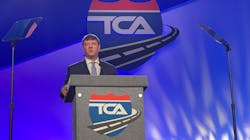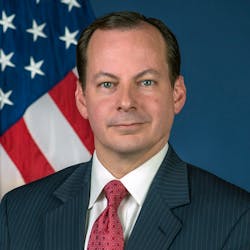FMCSA’s Mullen steps down, paving way for another acting administrator
The Federal Motor Carrier Safety Administration will have its third leader in less than a year after Acting Administrator Jim Mullen steps down at the end of August.
A U.S. Department of Transportation spokesperson confirmed Mullen’s plans to leave the FMCSA. As the deputy administrator, Mullen took on the role of acting administrator in late October 2019 after Raymond Martinez resigned. Martinez, who was nominated by President Trump and confirmed by the Senate, served 20 months as head of the oversight agency.
“We greatly appreciate Jim’s service and the work he has done for our country,” the DOT spokesperson told FleetOwner. “Wiley Deck, currently a senior policy adviser to the (transportation) secretary and former FMCSA director of government affairs, will assume the role of deputy administrator of FMCSA.”
James “Wiley” Deck served as the agency’s lead adviser on legislative affairs, congressional relations, and federal, state and local government policy matters before working directly for Transportation Secretary Elaine Chao. Before he worked for FMCSA, Deck was the director of oversight and investigations for the U.S. House Committee on Transportation & Infrastructure. As FMCSA’s deputy administrator he would take over as acting administrator when Mullen leaves at the end of August.
Mullen was the FMCSA chief counsel before becoming acting administrator on Oct. 28, 2019. Before working for the federal government, he spent more than 10 years working for Werner Enterprises. As deputy administrator when Martinez resigned, Mullen took over the day-to-day operations of the agency that oversees more than 500,000 trucking companies, 12,000 bus and motorcoach operators, and about 4 million commercial drivers.
During Mullen’s brief tenure as acting administrator, he oversaw rule changes to HOS regulations, which take effect in late September, and the industry’s response to the COVID-19 pandemic. The pandemic response has included regulatory relief for drivers hauling medical supplies and equipment along with essential supplies.
Martinez left the FMCSA but stayed with the DOT to manage a $500 million redevelopment of the John A. Volpe Nationa Transportation Systems Center in Cambridge, Mass.
With President Trump’s long backlog of appointees needing Senate confirmation across several federal departments, it is unlikely the FMCSA will get a permanent administrator before the fall election. It took Martinez five months to be confirmed after Trump nominated him in 2017. The presidential election is less than three months away.
About the Author
Josh Fisher
Editor-in-Chief
Editor-in-Chief Josh Fisher has been with FleetOwner since 2017. He covers everything from modern fleet management to operational efficiency, artificial intelligence, autonomous trucking, alternative fuels and powertrains, regulations, and emerging transportation technology. Based in Maryland, he writes the Lane Shift Ahead column about the changing North American transportation landscape.


